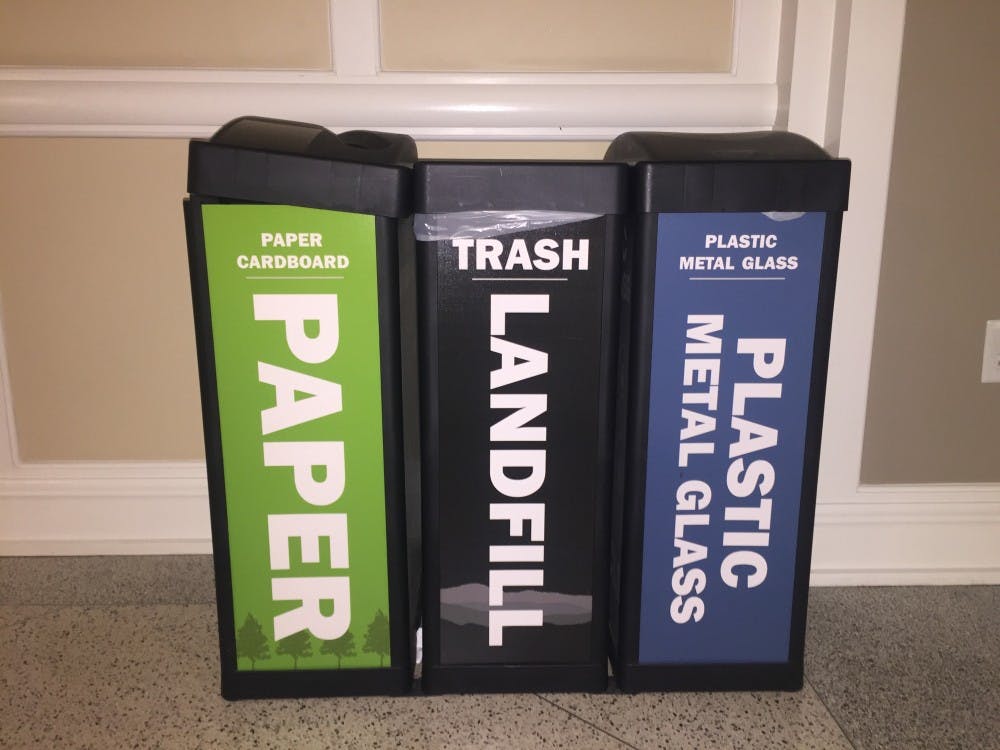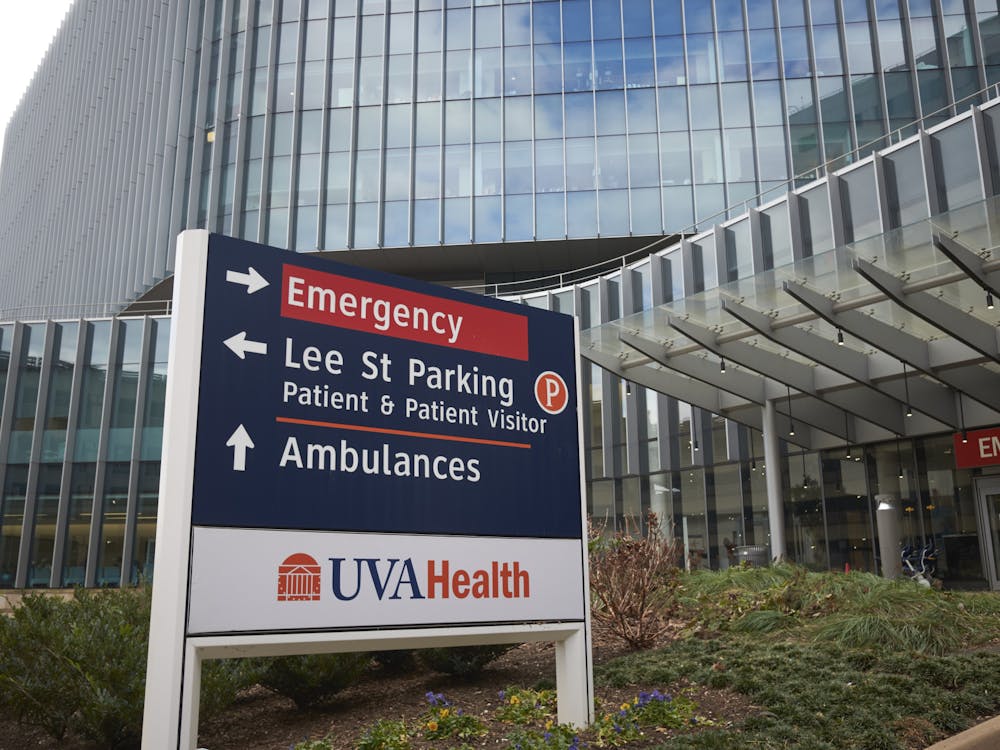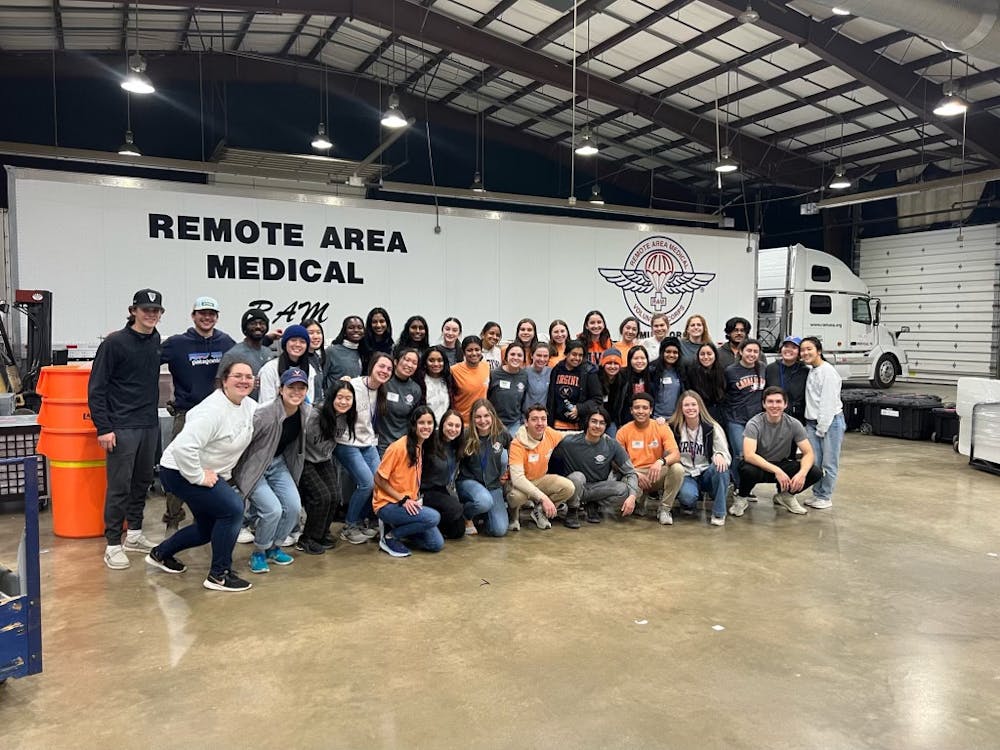What is single-stream recycling? When should plastics and paper be separated from trash? Differing rules governing recycling on- and off-Grounds can make recycling confusing for students. The City of Charlottesville follows a single-stream recycling process, allowing all recyclable materials to be collected together in one bin, whereas the University follows a multi-stream process, requiring recyclers to sort items into separate bins prior to collection.
Recycling at the University is run by Facilities Management. Victor Martin, the University’s recycling supervisor, said their 19-employee department covers over 460 buildings, totaling to over 14 million square feet of building space.
“We put containers in every building in common areas so that everyone can recycle plastics-metal-glass, paper to include confidential and broken down cardboard,” Martin said.
The separation of plastics, metals and glass from paper and from cardboard is what defines multi-stream recycling. While Facilities Management is in charge of how, when and what is recycled at the University, they try to keep students involved.
Third-year College student Abby Heher, chair of Student Council’s Sustainability Committee, said she and Facilities Management work together through the Council’s Zero Waste program. She said this initiative revolves around spreading knowledge and proper recycling materials to various events on Grounds.
“We listen to the voices of our students who also employ to help spread the message of green environmental living and practices to include recycling processes as well,” Martin said.
Martin said it’s common for recycling programs at other universities to be single-stream, and they are often student-run. Martin said the University’s Recycling Program is unique because their system is labor-intensive, with source-separated collection and processing departments.
According to Waste Management — the leading provider of waste management systems in North America — single-stream recycling increases recycling rates by an average of 30 percent. Waste Management says single-stream makes it easier to be an active recycler, increases landfill diversion and decreases collection costs.
However, the University’s Facilities Management chooses not to follow this “easier” process. Martin said despite the benefits of single-stream recycling, there are some concerns with it.
“We see the contamination as a big drawback with also prices built-into the single-stream as too costly to incur,” Martin said.
In an NPR report, Susan Collins, director of the Container Recycling Institute, explained the problem of single-stream contamination with the phrase “you can’t unscramble an egg.” She said that single-stream recycling yields more collected items, but they are of lower quality, making single-stream one of the worst recycling options.
“U.Va.’s multi-stream recycling system requires people to separate their recyclables upon disposal, but that simplifies the rest of the recycling process,” Heher said.
Since the University is an institution of higher education and not a municipality of Charlottesville, the two can have their own recycling systems, creating different recycling experiences for students depending whether they’re on or off Grounds.
“I lived off Grounds my second year, and my apartment complex did not offer recycling services,” Heher said. “Any student that lives off Grounds is able to sign up for the City of Charlottesville free recycling program, but unfortunately limited curb space for recycling bins can make that difficult.”
Heher said that she finds recycling on Grounds to be simple and accessible; however, she also said some students have complained that recycling is not easily accessible at all locations.
For example, third-year College student McKenna Savoca said in an email that she wishes the University would provide more bins at popular locations, such as the Rotunda or Madison Bowl.
In addition,Savoca said she noticed a discrepancy between the University’s waste disposal system and the system within other Charlottesville locations. In order to address this, as a member of the Kappa Kappa Gamma sorority, she is leading an initiative to establish a better system for recycling within all the off-Grounds Greek Housing.
“I asked our house cook where the recycling bin was,” Savoca said. “She responded with a confused face, ‘Honey, the trash can’s right there. We don’t do that here.’”
According to Savoca, many of the houses did have single-stream recycling, using van der Linde Recycling, which was the local trash collection service Time Disposal’s sole recycling plant in the area. Savoca said her plans included establishing a multi-bin system within the Greek Houses, despite the single-stream collection that many of them used.
“By making students actively think about having to wash and separate their materials, this will likely increase the chance that they will do this outside the sorority or fraternity house,” Savoca said.
However, Savoca said her initiative was briefly put on hold after the shut-down of VDL Recycling in February. She said for the past few months, any building who had previously used VDL had to put any recyclable materials in the trash, which was brought directly to landfills.
Martin explained that many off-Grounds apartment complexes and residences were using VDL, a company that accepted waste and recycling in one container. Martin said he credits their collapse to the costly built-in prices of single-stream recycling. Until buildings are re-assigned to a new recycling company, residents can choose to bring their recyclables to either the McIntire Recycling Center or the Ivy Material Utilization Center.
Savoca hopes that once Greek Housing is re-assigned to a new recycling plant, her initiative can be enacted.





